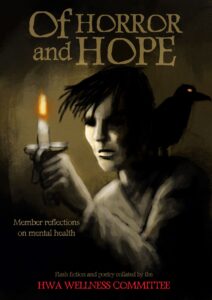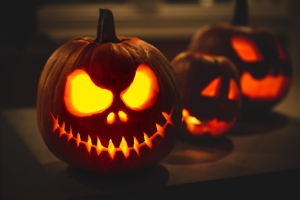Halloween Haunts: Of Horror, Hope, and Halloween by Dave Jeffery and Lee Murray
There is nothing that says ‘horror’ more than the Halloween holidays. Ask any fan of all things macabre for their favourite time of year and their obvious response is October, the Season of the Witch. Take this annual blog series, for example. Halloween Haunts exists as a celebration, a cornerstone of the horror writing community, a time of year when all of our passions are distilled into a month of festivities.
For horror fans, especially writers, Halloween lauds the awe and wonder of the fantastic and the innate terror of something unknown and otherworldly, and in doing so has us asking questions of what it means to be human, and what lies beyond our understanding. As creatives we want to explore these ghastly and horrific themes in literary form. To examine the things that scare us. Things we can’t always control. And as we know, when done effectively and with skill and creativity, the results are long lasting and deeply meaningful to both reader and writer. Horror can be fun, exhilarating, and thought-provoking. Words are powerful, and those that create horrific imagery are perhaps the most omnipotent and lasting of all. Therefore, their use requires great care and places an onus on the writer to take responsibility for what they create, especially when it comes to depictions of mental illness in society.
In June this year, the HWA Wellness Committee launched the official HWA Mental Health Initiative, a strategic approach to how to reflect the challenges of accurate and sensitive portrayals of mental illness in the horror genre. The programme has a scheme of work that seeks to foster sustained, incremental change in the attitudes towards mental illness and its portrayal in horror media. The initiative also recognises that many HWA members are themselves struggling with mental health issues on a daily basis and offers ongoing resources and engagement events to give voice to and empower those members, through inclusion and understanding. This has included scheduled panels (both online and face to face) at StokerCon 2022, HWA’s ChillerCon UK, and only this month, FantasyCon (UK) and significant online promotions through a series of online press releases. The HWA has also given writers opportunity to create mental health pieces that are the product of their own lived experience, or interpretations of mental illness, and which are available in the free, downloadable OF HORROR & HOPE anthology, edited by Wellness Committee co-chair, Lee Murray, and committee member, Angela Yuriko-Smith.
Of Horror and Hope is available here: https://horror.org/wp-content/uploads/2022/06/HWA-MHI-Of-Horror-And-Hope-Wellness.pdf

Those who suffer mental illness are battling exactly that, an illness. As writers, we are in a unique position to re-write the narrative to create change, and the HWA–through its Mental Health Initiative Charter–is striving to ensure that, going forward, portrayals of some of the most vulnerable people in our society, those with mental illness, will be represented with authenticity, sensitivity, and compassion. Halloween has potential to perpetuate societal stigma of mental illness, but the Wellness Committee has the stated intent to “challenge and reduce the stigma associated with mental health/illness”. So we’re pleased for this opportunity to guide members on how to approach the season with sensitivity towards those who endure mental health issues.
The full text of our Mental Health Initiative Charter can be found here: https://horror.org/mental-health-initiative-charter/
Some things to consider are:
Mental Illness as a Thing to Fear
In 2013, The Guardian newspaper in the UK reported that retail companies TESCO and ASDA (part of WALMART) had to remove from sale and apologise for Halloween costumes branded “PSYCHO WARD PATIENT” and “MENTAL PATIENT” after a public outcry. Using Halloween settings such as asylums, straight-jackets and the like add to the public perception that mental illness invariably leads to violence, a notion that is statistically unfounded (Mohit et al, 2016). These kind of misguided/outdated traditions are best avoided at Halloween, and in our writing, if society is to reduce the potential of perpetuating stigma.
Choice of Halloween Decorations
Using decorations that depict the stereotypical views of a psychiatric patient perpetuate stigma. We know what those are, we’ve seen them often enough across the genre. But there are plenty of other great ways to celebrate Halloween without using hurtful, stigmatising, triggering imagery. Ghosts and ghouls, werewolves, ogres, spiders—all manner of ghastly things—can be used as alternatives. Having fun shouldn’t mean someone else has to suffer the consequences. All it requires is a little thinking, and by thinking before you act, then you are already challenging stigma in a comprehensive way.
It’s easy to dismiss a discussion about a choice of costuming and baubles as being over-sensitive. You could assert that Halloween is just a bit of fun, and there is a danger of making something out of nothing. However, in the months since the launch of the HWA Mental Health Initiative, many members have come forward to express their thanks to the HWA for taking this work seriously. Many have spoken about their own lived experience of stigma and social isolation. What is clear from these discussions is that the impact of stigma in the horror genre is, for a lot of people, very real and lasts long after the Halloween decorations have been put away for another year. If we are mindful and sensitive with our choices, then everyone can enjoy this wonderfully ghoulish time of year.
Happy Halloween!

Reference:
Varshney M, Mahapatra A, Krishnan V, et al (2016) “Violence and mental illness: what is the true story?” J Epidemiol Community Health 2016;70:223-225.
Dave Jeffery is the author of 18 novels and novellas, two collections, and numerous short stories. His Necropolis Rising series and yeti adventure Frostbite have both featured on the Amazon #1 bestseller list. His YA work features the Beatrice Beecham supernatural adventures. Jeffery is also the creator of the A Quiet Apocalypse series which has received worldwide critical acclaim. Jeffery is a full member of the Society of Authors and a frequent reviewer for the British Fantasy Society. Actively involved in the Horror Writers Association (HWA), Jeffery is a mentor on the HWA Mentorship Scheme, and co-chair of the HWA Wellness Committee.
Lee Murray is a writer, editor, screenwriter, and poet from Aotearoa-New Zealand. She is a four-time Bram Stoker Awards® winner, Shirley Jackson Award winner, and a USA Today Bestselling author. She is proud to co-chair the HWA Wellness Committee.




The link to the pdf doesn’t work. Great post